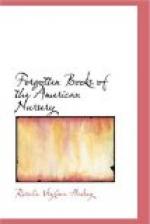Mein was among those accused of violating the “Agreement;” he was charged with the importation of materials for book-making. In a November number of the “Chronicle” of seventeen hundred and sixty-nine, Mein published an article entitled “A State of the Importation from Great Britain into the Port of BOSTON with the advertisement of a set of Men, who assume to themselves THE TITLE of ALL the Well Disposed Merchants.” In this letter the London Book-Store proprietor vigorously defended himself, and protested that the quantity of his work necessitated some importations not procurable in Boston. He also made sarcastic references to other men whom he thought the cap fitted better with less excuse. It was in the following December that he tried to keep this trade in children’s books by his apparently patriotic announcement regarding them. His protests were useless. Already in disfavor with some because he was supposed to print books in America but used a London imprint, his popularity waned; he was marked as a loyalist, and there was little of the spirit of tolerance for such in that hot-bed of patriotism. The air was so full of the growing differences between the colonials and the king’s government, that in seventeen hundred and seventy Mein closed out his stock and returned to England.
On the other hand, the patriotic booksellers did not fail to take note of the crystallization of public opinion. Robert Bell in Philadelphia appended a note to his catalogue of books, stating that “The Lovers and Practisers of Patriotism are requested to note that all the Books in this Catalogue are either of American manufacture, or imported before the Non-Importation Agreement.”
The supply of home-made paper was of course limited. So much was needed to circulate among the colonies pamphlets dealing with the injustice of the king’s government toward his American subjects, that it seems remarkable that any juvenile books should have been printed in those stirring days before the war began. It is rather to be expected that, with the serious turn that events had taken and the consequent questions that had arisen, the publications of the American press should have received the shadow of the forthcoming trouble—a shadow sufficient to discourage any attempt at humor for adult or child. Evidence, however, points to the fact that humor and amusement were not totally lacking in the issues of the press of at least one printer in Boston, John Boyle. The humorous satire produced by his press in seventeen hundred and seventy-five, called “The First Book of the American Chronicles of the Times,” purported to set forth the state of political affairs during the troubles “wherein all our calamities are seen to flow from the fact that the king had set up for our worship the god of the heathen—The Tea Chest.” This pamphlet has been one to keep the name of John Boyle among the prominent printers of pre-Revolutionary days. Additional interest accrues for this reason to a play-book printed by Boyle—the only one extant of this decade known to the writer.




